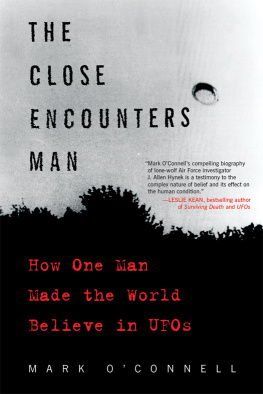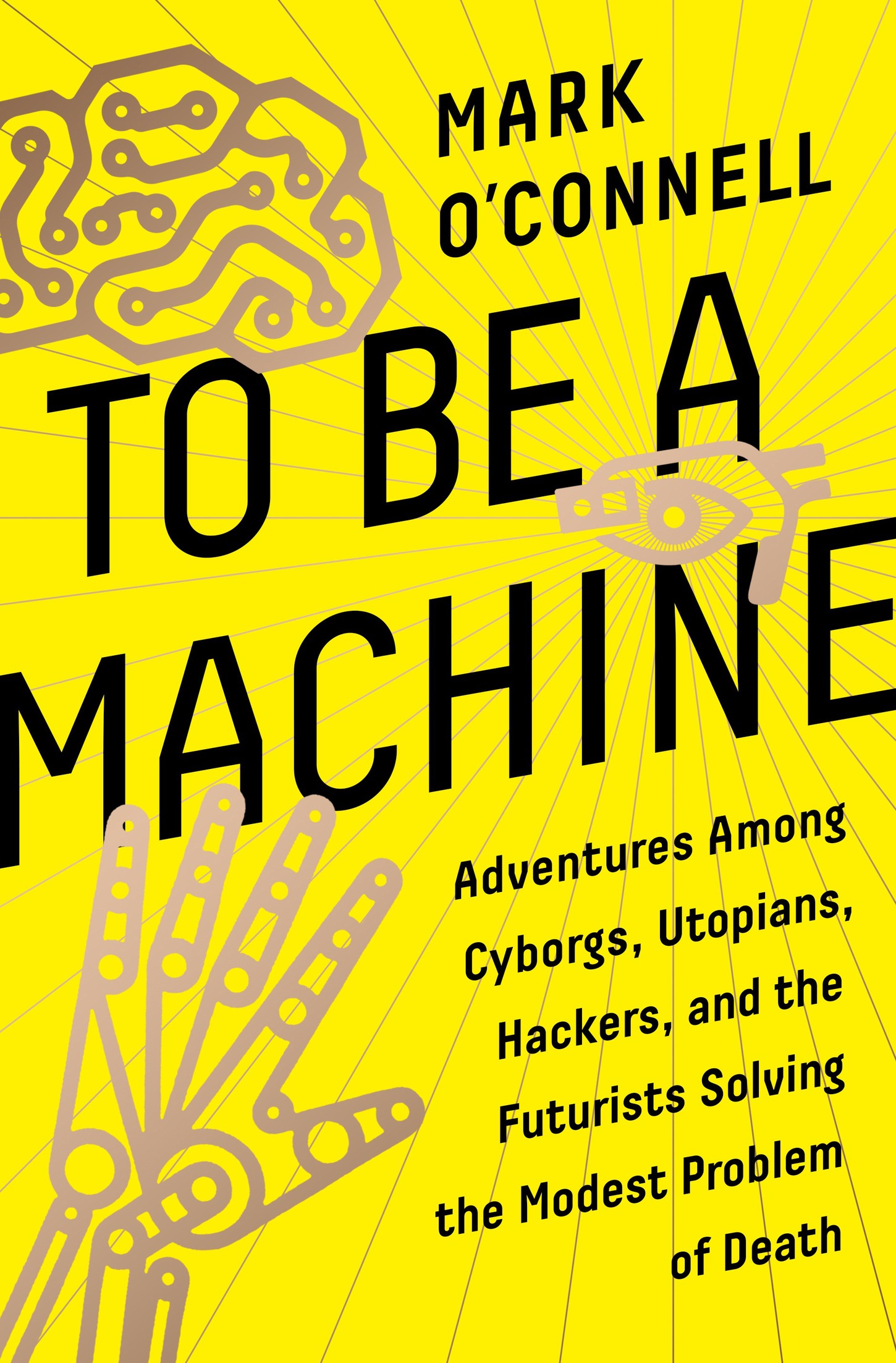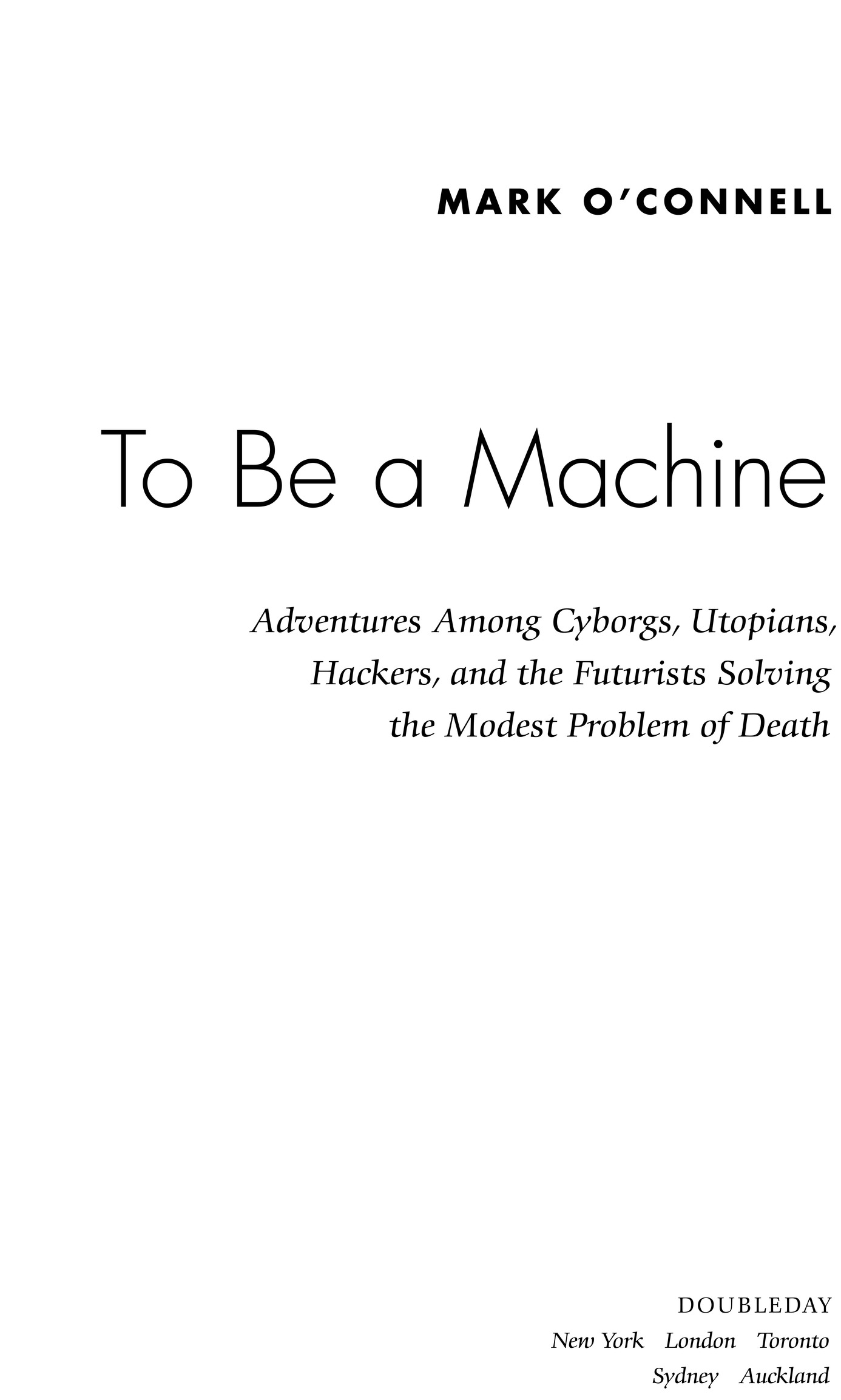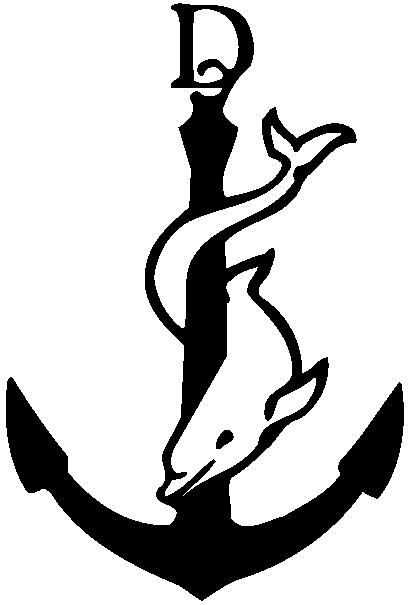All rights reserved. Published in the United States by Doubleday, a division of Penguin Random House LLC, New York, and distributed in Canada by Random House of Canada, a division of Penguin Random House Canada Limited, Toronto.
DOUBLEDAY and the portrayal of an anchor with a dolphin are registered trademarks of Penguin Random House LLC.
Names: OConnell, Mark, [date] author.
Title: To be a machine : adventures among cyborgs, utopians, hackers, and the futurists solving the modest problem of death / Mark OConnell.
Description: First edition. | New York : Doubleday, 2017.
Identifiers: LCCN 2016021725| ISBN 9780385540414 (hardback) | ISBN 9780385540421 (ebook)
Subjects: LCSH: Humanism. | Medical technologySocial aspects. | Technological innovationsSocial aspects. | ProsthesisSocial aspects. | BISAC: COMPUTERS / Intelligence (AI) & Semantics. | SCIENCE / Biotechnology. | COMPUTERS / Social Aspects / Human-Computer Interaction.
Classification: LCC B821 .O365 2016 | DDC 306.4/61dc23 LC record available at https://lccn.loc.gov/2016021725.
This is the whole point of technology. It creates an appetite for immortality on the one hand. It threatens universal extinction on the other. Technology is lust removed from nature.
System Crash
ALL STORIES BEGIN in our endings: we invent them because we die. As long as we have been telling stories, we have been telling them about the desire to escape our human bodies, to become something other than the animals we are. In our oldest written narrative, we find the Sumerian king Gilgamesh, who, distraught by the death of a friend and unwilling to accept that the same fate lies in store for him, travels to the far edge of the world in search of a cure for mortality. Long story short: no dice. Later, we find Achilles mother dipping him in the Styx in an effort to render him invulnerable. This, too, famously, does not pan out.
See also: Daedalus, improvised wings.
See also: Prometheus, stolen divine fire.
We exist, we humans, in the wreckage of an imagined splendor. It was not supposed to be this way: we werent supposed to be weak, to be ashamed, to suffer, to die. We have always had higher notions of ourselves. The whole setupgarden, serpent, fruit, banishmentwas a fatal error, a system crash. We came to be what we are by way of a Fall, a retribution. This, at least, is one version of the story: the Christian story, the Western story. The point of which, on some level, is to explain ourselves to ourselves, to account for why its such a raw deal, this unnatural nature of ours.
A man, wrote Emerson, is a god in ruins.
Religion, more or less, arises out of this divine wreckage. And science, tooreligions estranged half siblingaddresses itself to such animal dissatisfactions. In The Human Condition, writing in the wake of the Soviet launch of the first space satellite, Hannah Arendt reflected on the resulting sense of euphoria about escaping what one newspaper report called mens imprisonment to the earth. This same yearning for escape, she wrote, manifested itself in the attempt to create superior humans from laboratory manipulations of germ plasm, to extend natural life spans far beyond their current limits. This future man, she wrote, whom the scientists tell us they will produce in no more than a hundred years, seems to be possessed by a rebellion against human existence as it has been given, a free gift from nowhere (secularly speaking), which he wishes to exchange, as it were, for something he has made himself.
A rebellion against human existence as it has been given: this is as good a way as any of attempting to encapsulate what follows, to characterize what motivates the people I came to know in the writing of this book. These people, by and large, identify with a movement known as transhumanism, a movement predicated on the conviction that we can and should use technology to control the future evolution of our species. It is their belief that we can and should eradicate aging as a cause of death; that we can and should use technology to augment our bodies and our minds; that we can and should merge with machines, remaking ourselves, finally, in the image of our own higher ideals. They wish to exchange the gift, these people, for something better, something man-made. Will it pan out? That remains to be seen.
I am not a transhumanist. That much is probably apparent, even at this early stage of the proceedings. But my fascination with the movement, with its ideas and its aims, arises out of a basic sympathy with its premise: that human existence, as it has been given, is a suboptimal system.
In an abstract sort of way, this is something I had always believed to be the case, but in the immediate aftermath of the birth of my son, I came to feel it on a visceral level. The first time I held him, three years ago now, I was overcome by a sense of the fragility of his little bodya body that had just emerged, howling and trembling and darkly smeared with blood, out of the trembling body of his mother, from whom many hours of fanatical suffering and exertion had been required to deliver him into the world. In sorrow thou shalt bring forth children. I couldnt help but think that there ought to be a better system. I couldnt help but think that, at this late stage, we should be beyond all this.
Heres a thing you should not do as a new father, as you perch uneasily on a leatherette maternity ward chair beside your sleeping infant and his sleeping mother: you should not read a newspaper. I did this, and I regretted it. I sat in the postnatal ward of the National Maternity Hospital in Dublin, turning the pages of TheIrish Times in gradually mounting horror, browsing through a catalog of human perversityof massacres and rapes, of cruelties casual and systemic: splintered dispatches from a fallen worldand wondered about the wisdom of bringing a child into this mess, this species. (I seem to remember having a mild head cold at the time; this would not have helped matters.)
Among its many other effects, becoming a parent forces you to think about the nature of the problemwhich is, in a lot of ways, the problem of nature. Along with all the other horrors and perversities of the broader human context, the realities of aging and sickness and mortality become suddenly inescapable. Or they did for me, at any rate. And for my wife, too, whose existence was so much more entangled with our sons in those early months, and who said something during that time that I will never forget. If I had known how much I was going to love him, she said, Im not sure I would have had him. The frailty is the thing, the vulnerability. This infirmity, this doubtful convalescence we refer to, for want of a better term, as the human condition. Condition: an illness or other medical problem.





